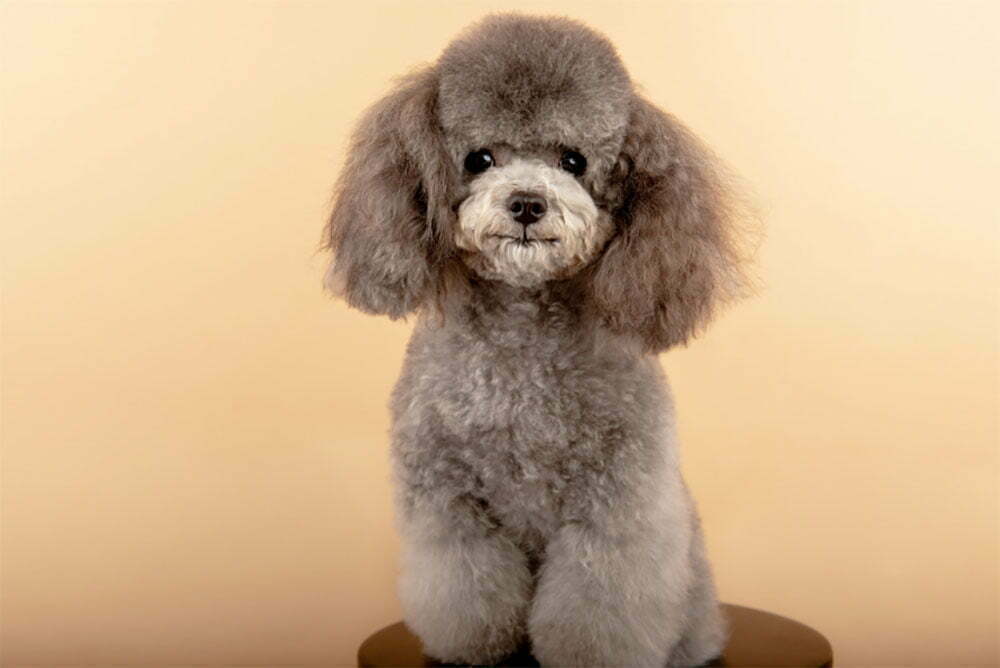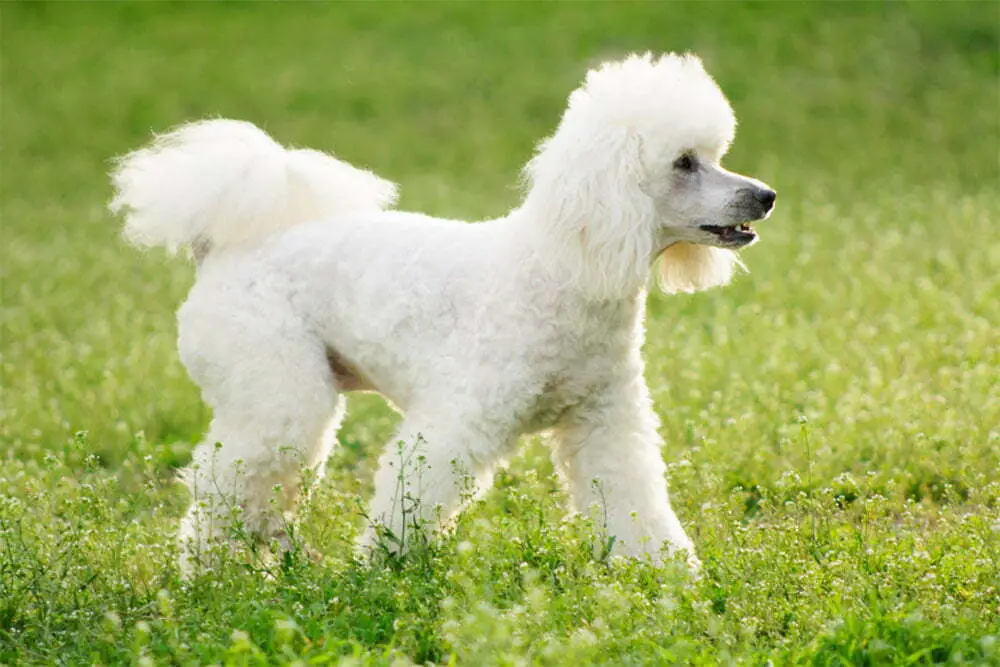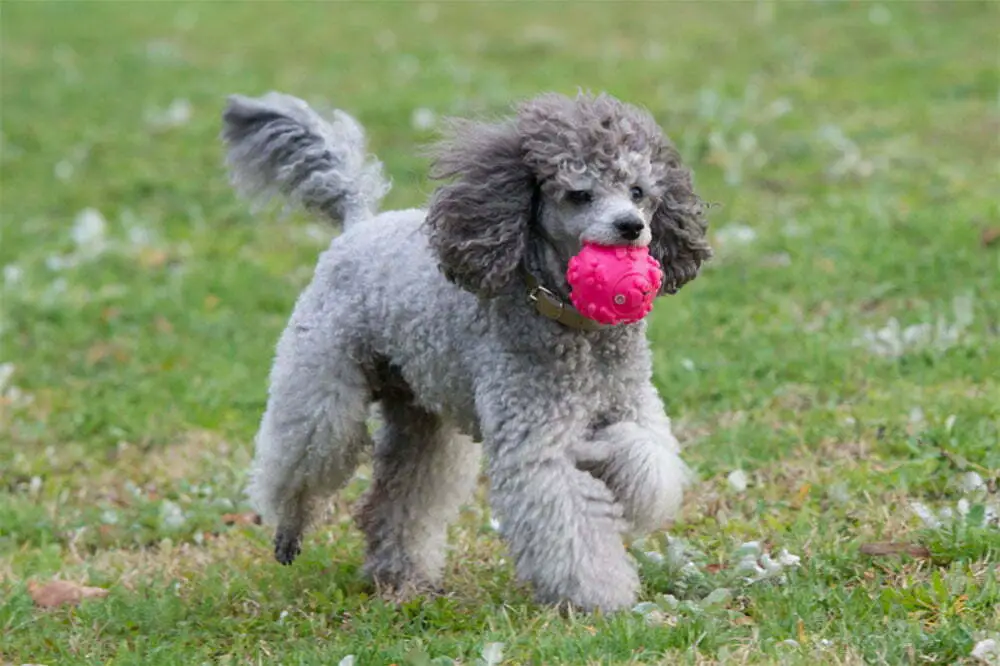When you think of a Poodle, your mind may instantly go to the elegant, luxurious dog with the iconic puffball trim that the Poodle is famed for.
However, don’t be fooled; these dogs are just like any other pooch and have been bred to do real jobs!
Originally bred to retrieve ducks and other game, the Poodle is a highly intelligent breed that loves having a job to do and as such, makes great assistant and therapy dogs!

With this high intelligence, loving nature, and as being a hypoallergenic dog breed, they are a favorite to be crossed with other breeds to create many of the doodle cross breeds we know and love.
So if you think this sounds like the dog for you, read on below to find out everything you need to know about Poodles.
Key facts
Are you thinking of getting a Poodle and want to know more about this breed? Or perhaps you are a devoted Poodle lover and are just wanting to read up about your favorite four-legged friend see below for the most asked questions about this stylish breed.
Average lifespan
On average, between 10 – 18 years, depending on the size of your poodle. The Standard Poodle has an average of 12 to 15 year lifespan whereas the Miniature and Toy range from anywhere between 10 to 18 years.
Minimum exercise (per day)
All of the Poodle varieties are active, and Poodles need at least 30 minutes to an hour of exercise daily to keep them healthy and prevent boredom! They should get a good walk each day and some other activities such as play or mental stimulation in the form of dog puzzles.
Mental stimulation is another really great way to tire your pooch out, even as much as physical activity would.
Coat length
The Poodles coat is curly, wiry, and dense, and it comes in a variety of colors such as apricot, black, blue, brown, cream, gray, silver, and white! The Poodle’s coat grows in a much similar way to humans, therefore, the length of your Poodle’s coat really just depends on how you would like it.
Some owners simply shave their poodles down short, whereas others prefer a more stylized trim, it’s a personal preference!
Minimum cost (per month)
The monthly costs of any dog can be difficult to calculate, and this is no different for Poodles. Each Poodle is different, and the breed itself has needs and potential health concerns that could increase the costs.
On average, monthly poodle costs are between $100 to $400 but can be much higher if your poodle needs anything in addition to basic supplies. This cost is made up of things such as dog food, flea and worming treatment, accessories, trips to the groomers, and potentially even doggy daycare or a walker.
Appearance
The Poodle is one of those immediately recognizable breeds. With a curly coat, long pointed nose, and small dark eyes, you could spot a Poodle easily from across even the most crowded dog park.
Famous for their ornate grooming style, if you were unfamiliar with the poodle, you may not know that this style of groom is nowadays reserved purely for the show circles, and family poodles tend to sport a more subtle clip in a short and fuss-free style.
Waterfowl hunters by nature, however, the elaborate coat design did once serve a purpose. The trimmed areas lightened the weight of the dog’s coat whilst the hair was left longer around the joints and vital organs to protect them from the cold water.
Size
There are three different sizes of Poodle, and all are considered part of the same breed. The three different sizes starting from largest to smallest, are:
- Standard Poodle
- Miniature Poodle
- Toy Poodle
However, no matter the size, they all share the same characteristics and are widely renowned for their intelligence and playful personality!
Average height
- The Standard Poodle, which is the tallest of the three, comes in at 18 to 24 inches.
- The Miniature Poodle is around 10 to 15 inches.
- And the Toy Poodle is by far the smallest at less than 10 inches tall.
Average weight
As the largest of the Poodle varieties, the Standard weighs on average 50 to 70 pounds and is therefore classed as a large breed, unlike its smaller counterparts.
The Miniature Poodle comes in at 10 to 15 pounds.
And the Toy Poodle weighs between 4 to 6 pounds.
Temperament
Loving, loyal, mischievous, and intelligent are often words used to describe this breed commonly. Despite their regal appearance, the poodle has a foofy streak and loves to get involved in games of any kind. Being highly intelligent and eager to please, the Poodle is a dog that you should have no trouble training.
Apartment living
All sizes of Poodles should do well in an apartment. They enjoy being close, and as long as you take them out for regular walks and trips to the potty, then there’s no reason why your poodle can’t have an enjoyable and comfortable life in your apartment block.
Good for novice owners
No reason a novice owner shouldn’t consider a Poodle as their first dog! Friendly, loveable, and highly intelligent, owning a poodle can be an advantageous experience.

As long as you are willing to dedicate time to obedience training and keeping your Poodle mentally stimulated, then you should have no trouble bringing one of these wonderful dogs into your family.
Sensitivity level
Poodles are known to be quite sensitive dogs and don’t appreciate raised tones in the household. As they are a smart breed, they are able to pick up on the tones of our voices, and too much shouting could make your Poodle become anxious, which can result in some unwanted behaviors.
Tolerates being alone
Bonding strongly to their owners Poodles are not a breed that enjoys being left on their own. In general, dogs are pack animals and don’t like being left for more than a few hours at a time.
Combine that with the Poodle’s mischievous nature, high intelligence, and potentially anxious disposition, and you could find yourself coming home to some accidents in the home or some couch cushions that have been destroyed.
If you need to leave your Poodle for an extended period, you should consider getting a sitter or taking your pooch to doggy daycare!
Tolerates cold weather
Only having a single-layer coat does not help your Poodle to tolerate cold weather very well. The Standard Poodle will fare slightly better in cold weather purely due to its size, but you should consider getting your Poodle a coat or warm sweater when the colder months come.
Tolerates hot weather
Poodles do slightly better in the heat than they do in the cold, but they still aren’t well suited to being outdoors in these conditions.
You should minimize the amount of time your Poodle spends outside in the heat and ensure plenty of shade and cool water for them to relax in. Always make sure to monitor your dog for any signs of dehydration or heat exhaustion.
Affectionate with family
Poodles are loving and affectionate dogs who enjoy spending time with their families. Most of them enjoy cuddling and giving kisses, and in some cases, they will even pester you for them!
Just remember to be careful when approaching any dog, especially if they are sleeping, as you do not want to frighten them or make them uncomfortable. You should allow them to come to you for affection.
Kid-friendly
Poodles love children and will enjoy having playtime with them. With a lot of energy to burn, they can tire out even the most energetic of children!
You should never leave a child unsupervised with any dog. Children can often be clumsy or unsure of their footing and could easily trip and fall onto the Miniature or Toy Poodle. And not to mention, the Standard Poodle could easily bump into your toddler and knock them over as well.
Dog friendly
Poodles of all sizes get on great with other dogs, especially if they are socialized from a young age. If your Poodle shows any signs of aggression toward other dogs, you should address this with a professional dog trainer.
Friendly towards strangers
As a friendly and people-originated dog, the Poodle should have no trouble when it comes to meeting strangers. As with everything, however, careful consideration should be taken when socializing them to make sure they don’t become overwhelmed or frightened.
Health and grooming
Shedding
Poodles are hypoallergenic dogs which means that they do not shed, so even people with allergies can own one, and they won’t have a reaction! This hypoallergenic nature is what makes Poodles so popular in the cross breeding with other dogs, as this is a very desirable quality for dog owners.
Drooling
As Poodles are hypoallergenic, this means that they also do not drool, so this is one less thing Poodle owners will have to worry about.
Grooming
Grooming a Poodle isn’t for the fainthearted. Poodles are high-maintenance dogs that require regular grooming every three to six weeks to keep their coat in good condition. If you are considering a Poodle, you will need to consider the upkeep of the coat and the expense of grooming.
Most owners pay a professional groomer to handle that side of dog ownership, but if you’re dedicated and have the time, you can learn to groom your Poodle yourself.
And even if you do decide to let a professional handle the complicated grooming, your Poodle still needs daily brushing. Because Poodles don’t shed like other breeds, loose hair collects in the coats, and unless it’s brushed out daily, the hair will mat very quickly.
Many Poodles also have weepy eyes that stain the hair under their eyes. The lighter your dog’s coat, the more noticeable the tear stains will be. To cut down on staining, wipe around the eyes and face every day with an alcohol-free pet wipe or wash cloth dampened with warm water.
General Health
Like all dogs, Poodles are prone to some health conditions that it is important any potential owners should acquaint themselves with before taking their Poodle puppy home. This is not to say that your Poodle will ever experience any of these conditions, but it’s a good idea to be aware of them.
Common health problems:
- Addison’s disease
- Cushing’s disease
- Epilepsy
- Hip Dysplasia
- Sebacsue Sdentitis (SA)
- Von Willebrand Disease (vWD)
Potential for weight gain
Like any breed, the Poodle will quickly pack on the weight if he’s overfed. Being overweight is not good for your dog and can cause joint problems and other health issues.
It is a good idea to limit the treats you feed them, keep them active, and feed them in meals rather than leaving food available at all times.
Although many owners of Miniature or Toy Poodles, in particular, give their dogs table scraps, it is best if you can resist those pleading eyes; otherwise you could end up creating a finicky eater that will likely turn their nose up at healthier dog food alternatives.
Trainability
Easy to train
You should not have any trouble training your Poodle.
They are very quick and clever and enjoy; however, this intelligence can quickly turn against you if you are not careful. For example, a Miniature Poodle who is babied and carried everywhere will catch on very easily before you know it; they will expect to be carried everywhere!
Intelligence
The Poodle is a highly intelligent breed; in fact, they are one of the smartest breeds in the world! This means that your pooch will require a lot of mental stimulation throughout the day to ensure they don’t resort to unwanted behaviors in the home, such as destroying furniture.
A great way to do this is to give your Poodle a job, such as training them to help around the house the way service dogs do or by entering them for obedience or an agility class!
Potential to bite
As much as some breeds have aggressive or dangerous reputations, the truth is that any dog can be aggressive. This can be down to either the dog’s individual personality or a result of a lack of training when they were a puppy.
Poodles, as a breed, are not typically aggressive dogs but can be known as biters. This can be down to their intelligence as if not correctly disciplined; they will assume they are the alpha and can nip to assert their dominance over what they perceive to be their pack.
Poodles may develop anxiety which in turn can make them act out in an aggressive manner. The best way to keep your Poodle from becoming anxious is to make sure it is well-socialized and has lots of new experiences as a puppy.
Tendency to bark or howl
The Standard Poodle is not a particularly vocal dog; however, its smaller counterparts certainly can be. Luckily as Poodles are very easy to train, it shouldn’t be difficult to train this behavior out of them if it is unwanted!
History
Believed to have originated in Germany, it wasn’t until the Poodle came to France that it really developed into its own distinct breed.
The poodle is a very old dog breed, with depictions of them dating to Egyptian and Roman times BC! The depictions show poodle-like dogs retrieving game and herding animals, which is what the Standard poodle was, in fact, bred for.
The French used the Standard Poodle for duck hunting whilst the Miniature Poodle was used for hunting out truffles in wooded areas. The Toy Poodle, however, had quite a different job to do and served as a companion to the French nobility.
Many well-to-do owners carried their Toy Poodles in the large sleeve of their shirts, which led to Toy Poodles being known as ‘sleeve dogs.’
Not only that, however, Poodles were loved by traveling performers and excelled as circus dogs!
They were trained to perform tricks and were dressed in costumes, having their fur styled into fantastical shapes, which wealthy patrons adored and began to replicate on their own poodles at home – creating the iconic Poodle style that we all know today.
The first Poodle was registered in the U.S. in 1886 but remained a fairly rare breed until after World War Two. By the mid-1950s the Poodle had become one of the most popular breeds in the country and has remained so ever since!
Costs
A Poodle puppy can cost you anywhere between the region of $1000 to $4000 depending on breeding and size, with Miniature or Toy Poodles being more expensive than their larger Standard counterparts.
Despite being a pure-bred breed, check your local adoption shelters or any free pages to see if any Poodles are available for rehoming.
Fun facts
- Nintendo modeled a character after the Standard Poodle! A dog named Pappy Van Poodle appears in the game Rusty’s Real Deal Baseball.
- Miniature poodles have appeared in many movies, including Jaws, Bingo!, and The Pink Panther.
- Lucille Ball, Ertha Kitt, James Brown, and Elizabeth Taylor have all had an affinity for toy poodles.

